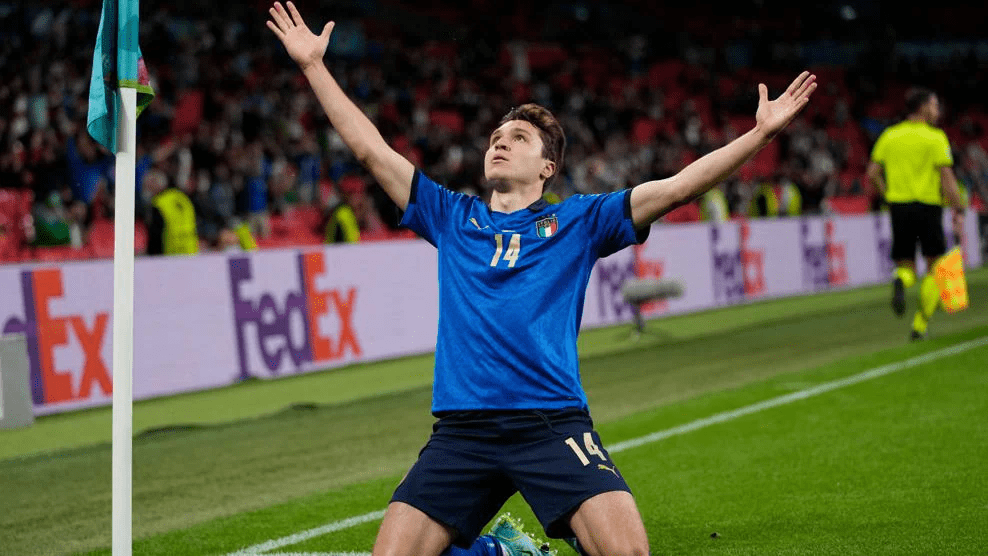Federico Chiesa: the boy from Florence who became too good to ignore
Italy had slumbered to a bore draw against Austria looking bereft of any real guile or class. With another gruelling thirty minutes to play against stubborn, hard-working opposition without a breakthrough was the last thing Roberto Mancini’s languid side needed. Five minutes, three touches and one moment of genius later and the Azzurri were 1-0 up.
Federico Chiesa went sliding to the corner flag on his knees, arms outstretched, announcing himself on the international stage. A theatrical expression worthy of a player truly capable of artistic wonder.
The Chiesa name is no stranger to the European Championships. Federico’s father, Enrico, also represented Italy at the tournament in 1996, coincidentally also held in England. Enrico Chiesa equalised against the Czech Republic at Anfield. 25 years later, his son opened the scoring against both Austria and Spain at Wembley.
Chiesa has gradually risen to stardom over the past couple of years. Having developed through the Fiorentina youth setup, he made his debut at eighteen in the opening game of the 2016/17 Serie A season against Juventus.
At the turn of the year Chiesa would score his first league goals in back-to-back games against Chievo Verona and Genoa respectively. He quickly became undroppable and impossible to ignore.
A decent debut season would be followed by three very strong campaigns as he grew into one of the most dangerous wide players in Serie A. During this period, he scored 22 goals and assisted a further 19, impressing enough to earn himself his first international cap.
Chiesa finished as Fiorentina’s top scorer in both the 2018/19 and 2019/20 seasons and it became evident that he had become a big fish in a small pond. He had become impossible to ignore, this time for the European giants.
In swept Juventus to steal away the Viola’s crown jewel. Chiesa signed on a two-year loan deal with an obligation to buy in a deal which could reach as high as €60 million (£54 million). He joined the Old Lady attack already littered with stars. It’s harder to be a big fish in a pond which is also home to Cristiano Ronaldo and Paulo Dybala.
Once again, Chiesa would need to become too good to be ignored.
Getting sent off on his debut for a late challenge a terrible start. Generally, he struggled to establish himself in Turin for the first half of the season, scoring just two goals in all competitions before Christmas.
Chiesa has become the player to take games by the scruff of the neck and drag his side to victory
However, in the past seven months, Chiesa has turned his somewhat patchy form around and exploded into life. He scored twelve goals and recorded four assists in the second half of the season. His upturn of form was imperative to propelling Juventus to a finish within the Champions League places and winning the Coppa Italia, a feat which appeared doubtful at the season’s midpoint.
Chiesa was the standout performer on a series of occasions, most notably in the Champions League Round of Sixteen, scoring a brace to send the game to extra-time in the second-leg against FC Porto. They would lose on away goals, but Chiesa had outshone his more reputable teammates.
Chiesa would again steal the headlines against Atalanta in the Coppa Italia final.
With the scores tied at 1-1, Chiesa played a one-two with Dejan Kulusevski, making a darting run into the Atalanta box, before slotting the ball in the near post. Displaying composure and maturity beyond his years, Federico Chiesa helped his side win the Coppa Italia, just as his father had done in 1999.
Federico Chiesa has become the player to take games by the scruff of the neck and drag his side to victory. So, it is unsurprising he has done just that for his national team at the European Championships.
It is perhaps more surprising it took until the third group stage game, a meaningless bout against Wales, for Chiesa to start. He impressed, but not enough to disrupt the settled front three of Lorenzo Insigne, Ciro Immobile and Domenico Berardi, that scored six goals in the opening two games.
With the front three stifled by Austria, Chiesa was called upon by Mancini. He rewarded his manager with a goal and has not been dropped since, replacing Berardi as the right forward. He has become impossible to ignore.
The system implemented under Mancini suits Chiesa’s direct movement and constant eye for goal. Operating as an inside forward he is given the license to cut inside and run at defenders. One of Chiesa’s most gifted attributes is his ability with both feet, allowing him to take up any of the positions along the front line.
His goal against Austria was taken with his left foot, hammered in from a tight angle. This was followed by a goal in the semi-final against Spain, this time with his right foot, curled with devastating accuracy into the far corner. He can produce with both power and accuracy, regardless of with which foot.
Italy will be hopeful Chiesa will be able to continue his goalscoring form into the final. If the Azzurri are to breakdown one of the strongest defences in the tournament, he will be key to any threat they carry. England will need to try and keep the dangerman quiet, but Federico Chiesa is not one to allow himself to be ignored very easily.

Comments